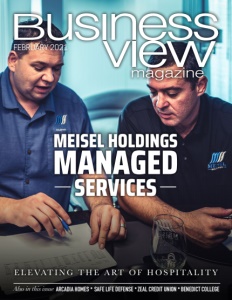American Subcontractors Association (ASA)
Better construction through fair construction
Business View Magazine interviews Richard Bright, COO of the American Subcontractors Association, for our focus on the U.S. Construction Industry
The American Subcontractors Association (ASA) is the united voice of subcontractors, specialty trade contractors, and suppliers before all branches and levels of government – a bold and important responsibility that the Association takes very seriously. ASA adheres to and promotes quality construction, ethical and equitable business practices, safety in the work environment, and best industry practices. In these uncertain times, the ASA advocacy team also ensures that members have the latest in COVID-19 information. Any person, firm or corporation that in the normal course of business furnishes subcontract labor and/or materials to the construction industry, or provides a service to such subcontractors or material suppliers, is eligible for regular membership in the association.
Business View Magazine recently spoke with ASA representatives Richard Bright, COO, and Mike Oscar, Director of Government Relations, about the Association’s importance to its members and issues facing the industry at large. The following is an edited version of our conversation.
BVM: Can you share the history on ASA?

Bright: “The organization was founded in 1966 in Washington, DC, that was our first, also our founding chapter. We then opened a chapter in Maryland and we now have chapters throughout the U.S. We were founded initially for advocacy reasons in representing both specialty contractors and suppliers. And one of the main reasons we were founded was in respect to prompt pay and payment issues for subcontractors. There’s a chain of process within the construction industry – owner, architect, general contractor, and then the subs, so that’s initially why we were founded.
“Overall, we haven’t changed our mandate in the sense that we’re still the voice and the advocate for the subcontractor and the supplier. Some of the issues may have changed or we may be dealing with a lot more issues but, I hesitate to say it, we still have payment and contract issues that arise in the industry. So while we’ve been successful in that initial mandate, there is still work to be done around the country and every state is a bit different. And we’ve added on to what we do in the way of education and networking and other programs.
“Our mission statement today is: ‘ASA promotes the rights and interests of subcontractors, specialty contractors, and suppliers by building strength in community through education, advocacy, networking, and professional growth.’ When ASA was founded it was initially an advocate and very much around that central issue of payment. Now we’re representing and promoting all interests but in a very collaborative and community-driven manner and our whole goal and our vision is ‘Better Construction Through Fair Construction’.”
BVM: What role does advocacy play?
Oscar: “On the advocacy side, our issues are non-ideological, they are purely procurement related issues. Ultimately, they’re payment issues. Subcontractors want to be paid, on time, and treated fairly. On the education side, we work to ensure that legislators are aware of the role and impact that subcontractors play within the construction industry.
“The construction industry has changed dramatically over the years, so when you’re meeting with members of Congress, congressional staff, and/or regulatory agency officers or staff, you must bear in mind that their understanding of the construction industry may be circa 1970. Also, their degree of separation and understanding of the subcontractor construction industry may be three or four generations removed. That’s why ASA’s advocacy becomes extremely important. Subcontractors comprise roughly 75% of the construction industry.”
Bright: “ASA has been very successful in that regard. For example in New Mexico retainage is prohibited, in other states we’ve reduced it from 10 to 5, so there are laws that we’ve had success with around the country. We’ve won court cases that have set a precedent. And there are some great collaborative efforts between the GCs or direct to owner, so it’s not all doom and gloom, but there is still a significant amount of change that needs to take place. Very much around risk transfer and contract language, etc.”
BVM: How has COVID-19 impacted your members?
Bright: “We’re an institutional membership with about 2,600 employer members with over 6,000 individual member contacts from those member companies who are listed in our database. And we have about 35 chapters around the country in various degrees of size and sophistication.
“All of our members are in commercial or industrial construction. Very few do residential, although some will do it in the sense of big, multi-unit housing condos but we still class that as commercial because of the relationship with the owner, GC, etc. We don’t have the regular home builder or residential painting contractor. We represent purely the specialty contractor. That’s important to note because during COVID, for the most part, construction was deemed essential and shielded, so our guys were able to do work. If there was a delay, they still had the contract and they knew they were going back to work, and they had a backlog of work they had to complete.”

Oscar: “When the pandemic first started, we had over 1,400 ASA members write to 38 governors requesting that construction remains essential. That’s an awesome accomplishment, which directly demonstrated ASA’s advocacy impact. Throughout the pandemic, most of our members have been declared essential. Unlike other construction trade associations, ASA is the only association to have an attorneys’ council, which files ‘friend-of-the-court’ briefs to inform the Court regarding the broader impact of relevant construction industry cases throughout the country. We have won dozens of these cases since 1997, vindicating subcontractor rights today and into the future. To that end, our members have heavily relied upon this council during the pandemic to ensure projects are completed on time and to better understand the implications of force majeure clauses in construction contracts.”
BVM: How does the Association communicate with members, since in-person events aren’t possible right now?
Bright: “Our 2020 convention was in Vegas early on when COVID was just hitting, so we did get a few last minute cancellations but we were lucky to have it take place. However, we’ve had to postpone our Feb 2021 SUBExcel convention in Florida to 2022. We’ve also had to do virtual board meetings and we’re having weekly open-ended conference calls, we do a lot of webinars, GoToMeeting calls – we’re just like everybody else, using the virtual format.
“ASA made a decision not to do a totally virtual convention. We’ll do a webinar series and continue with education but we’ve never seen virtual trade shows do as well as they can in person. So we haven’t gone that route. However, a lot of our chapters are having meetings, practicing physical distancing, wearing masks, and depending on the climate they’re outside in some cases. But it all depends on the state restrictions.”
BVM: Looking ahead, what changes do you foresee in the industry and how will ASA continue to be a viable voice for your members?
Bright: “We’re well positioned financially, we’re secure, we’re solid, we’ve got great leadership and our strategic plan is all about growth. So we’re excited. And we’re confident that the environment for collaboration is improving. The unknown is really just the marketplace. You’ve got a lot of turmoil because of COVID but also because of recessions in Europe and internationally. Our major concerns are the increase in the cost of goods and the fluctuations around that. And the increased cost of labor and finding qualified labor is a big challenge. We’re hoping that 2021 and beyond will still be good for construction. So we’re hopeful from an economic standpoint but we still don’t know where the global uncertainty with COVID will impact us in the short to mid term.”
Oscar: “There is great anticipation for another COVID-19 stimulus package and the impact it will have on our members. We’re also preparing for an infrastructure spending package that will have a trickledown effect on our members. Finally, to Richard’s point, locating a reliable workforce is critical and we continue to review all apprenticeship-style programs to encourage men and women to get involved in the specialty trade construction industry.”
AT A GLANCE
American Subcontractors Association (ASA)
What: The industry voice for construction subcontractors, specialty contractors, and suppliers
Where: Based in Alexandria, Virginia
Website: www.asaonline.com

